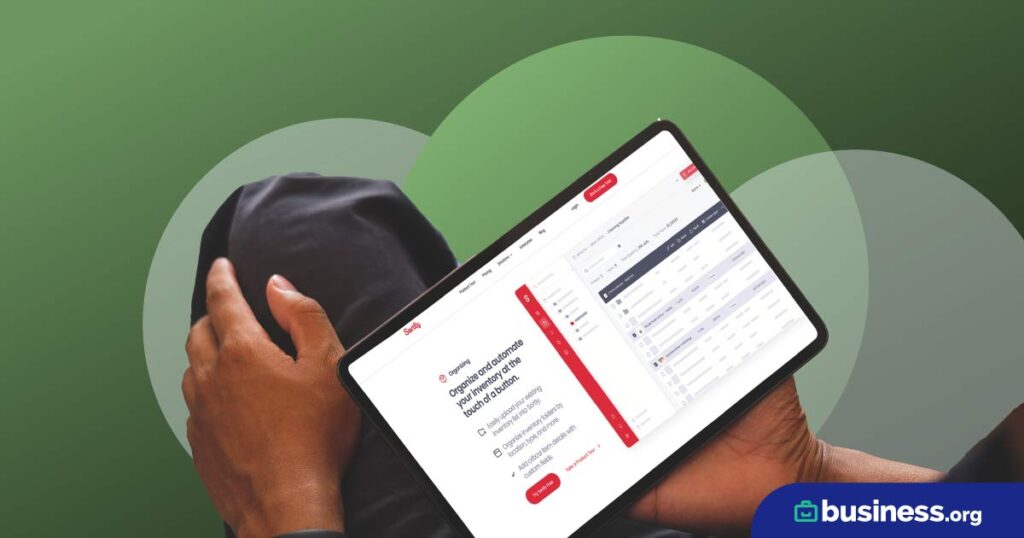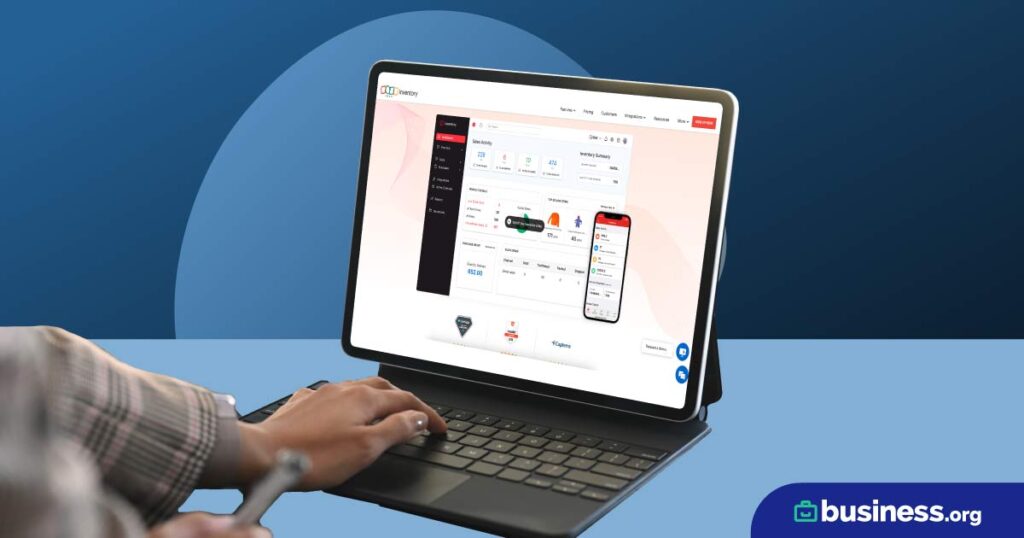We are committed to sharing unbiased reviews. Some of the links on our site are from our partners who compensate us. Read our editorial guidelines and advertising disclosure.
What Is ERP Inventory Management?
Point-of-sale (POS) systems, accounting software, and inventory management solutions all help you run different elements of your business, but the data they track is all interconnected. If your business is small, you can purchase separate applications and enter data into each platform individually. But if you’re running an enterprise-level business, the sheer number of products and transactions can be overwhelming.
Enter ERP software. Short for enterprise resource planning, ERP software allows you to manage all your vital business processes from a single platform. This gives you smooth data integration and transparency throughout your business—so everyone from your supply chain management to your project management team can access the information they need to do their jobs.
Intrigued? We’ve explained everything you need to know about ERP inventory management in the article below.
What is an ERP inventory system?
An ERP inventory management system is basically a huge platform that helps you manage every aspect of your business.
To understand this, let’s first think about all the processes included in your business—like inventory management, supply chain management, logistics, warehousing, sales, accounting, project management, and human resources (to name a few).
Now, most small businesses can get by with one or two applications to help them manage their most important business processes (like accounting and inventory management software, for example). Everything else is tracked manually via physical paperwork, digital documentation, and occasionally cloud-based solutions like Google Drive.
But this doesn’t work so well for larger, enterprise-level companies. With disparate systems (a.k.a. solutions that don’t integrate and share information), you have to enter information into each software separately. That’s a huge time suck if your business is selling hundreds of thousands of dollars’ worth of products each month.
ERP vendors simplify the process. Instead of running (and paying for) separate software for each of your business processes, you use a single platform to track every product, cost, sale, employee, and customer interaction. ERP implementation across your business also allows you to carry over data between processes, which cuts down on your data entry time and helps keep everyone in your organization on the same page.
By signing up I agree to the Terms of Use and Privacy Policy.
How does an ERP work?
systemERP systems are made up of different modules, each of which performs one of your business processes. ERP vendors offer their own combination of modules, but here are some of the most common modules included with ERP software:
-
Material resource planning (MRP)
-
Supply chain management
-
Inventory management
-
Point-of-sale (POS)
-
Accounting
-
Customer relationship management
-
Project management
-
Human resources
Each module works like a separate software, but all modules are interconnected within the platform. This connection allows the software to share relevant data across platforms. That way, your accounting solution can automatically access both the sales price and the exact shipping, storage, and production costs of each product to calculate a completely accurate profit margin—all without you having to do any extra work.
ERP inventory management in use
To give you a better idea of how an ERP platform can streamline operations within your business, here’s an example of how a typical company might handle a problem with and without an ERP solution.
The problem
Your business is working on a new product, which is currently in the pre-production phase. Your sourcing agent is working with a manufacturer in China to get the product made, but there’s a snag in the resource planning that delays production by six weeks.
Meanwhile, your supply chain coordinator is trying to arrange shipment and logistics for the product once it’s finished. Your project management team is trying to figure out why the product isn’t being delivered on time. And a customer who’s pre-ordered the product reaches out to your customer service team to find out why they didn’t receive their order on time.
No ERP software
Since none of the other departments within your business can access the sourcing agent’s work, they email the sourcing agent with questions and follow-ups. The sourcing agent then spends an extra five hours that week answering emails, in addition to their regular work. Human resources then needs to know why the sourcing agent is going into overtime—which means more emails and follow-up time.
The production delays also inflate the cost of the product. The sourcing agent must then email the accounting team to let them know that the profit margin for the item is going to be lower than previously expected.
ERP software
With ERP software, each department works within their own module, but data is shared across the platform. That means your supply chain coordinator can see the product delay as soon as it happens and adjust accordingly—without the need to follow up with the sourcing agent.
The delay also triggers an automatic email from your customer relationship management platform, which informs all pre-order customers that their order has been delayed. And in the event that a customer calls with a question or concern, your customer service team can look up the status of the order and provide in-depth information about the customer’s items.
Because the ERP system makes everyone’s workflows transparent, your project management team and human resource department are able to understand the project delay and overtime hours without the need for individual follow-up with the sourcing agent. And as soon as the sourcing agent records the increased cost of the product, that cost is automatically reflected within your business’s accounting records.
In general, the ERP software makes the business processes throughout your company smooth and efficient. This frees up your time (and your employees’ time) to focus on the business functions that help your business grow, rather than just maintain the status quo.
Pros and cons of ERP inventory management
Advantages of ERP Software
As you can imagine, ERP integration allows you to automate a lot more processes across your business. You no longer have to spend (or pay someone else to spend) extra time entering your inventory costs into your accounting software so you can calculate your cost of goods sold.
Cloud-based ERP solutions also allow you to enjoy real-time data tracking—so all your business units (like your customer service and supply chain teams) can look up the status of any given product or order whenever needed. That gives you enhanced business intelligence that can help you make the best decisions for your business based on the most up-to-date information.
This efficiency and transparency can also carry over to your interactions with any third-party companies you work with. Most ERP solutions can integrate smoothly with commonly used third-party software (like FedEx shipping, for instance), so you can still manage all your third-party transactions within your ERP platform.
Best of all, ERP solutions can help you save money since you pay a single rate for your entire collection of business modules (rather than a separate fee for each service). Plus, ERP systems make your business processes more efficient, which saves you money too.
Disadvantages of ERP software
Of course, ERP solutions aren’t without their drawbacks.
Because ERP software aims to provide a one-size-fits-all solution to all your business processes, they can sometimes be more complex than your standard inventory management platform. That makes implementing ERP across your business difficult and expensive—especially if you have to hire an ERP consultant to run your system for you.
ERP solutions are also big, which can make them slow and clunky—particularly if you’re using cloud-based software in an area without a reliable internet connection (like in a warehouse). If it takes an hour for the system to reflect new sales and inventory check-ins, that could cause major disruptions for businesses that rely on accurate data to make down-to-the-minute decisions.
And while ERP implementation can save some companies money, smaller businesses that are currently using only a couple of software solutions will likely wind up paying significantly more for an ERP solution.
Types of businesses that should use an ERP system
Due to its complexity and cost, ERP software isn’t right for all businesses. But if you run an enterprise-level business, it could be the best fit for your company.
Not sure if you’re an enterprise-level organization? Ask yourself these questions:
- Does my business use complex sales or supply chain processes? If you regularly coordinate quotes from multiple vendors, negotiate large contracts, or develop products over long periods of time, your business likely has enterprise-level needs.
- Does my business handle high-volume sales or a wide catalogue of products? If so, an ERP solution can help you avoid the time-intensive work of sharing data between each of your business applications manually.
- Does my business employ hundreds or thousands of workers? If your company has a lot of employees, it may be helpful to consolidate your human resources solution into a single platform with your other business processes.
- Does my business have advanced customer service needs? If you want your customer service team to have access to shipping info on customer orders, ERP software could help you connect your inventory and retail data to Salesforce or whatever customer relationship tool your company uses.
If you answered “yes” to any of the questions above, you might want to start scoping out ERP vendors to figure out which options offer the modules you need. Keep in mind, though, that if you need only one or two modules, ERP integration may be more expensive, complex, and time-consuming than it’s really worth.
The takeaway
ERP implementation can be a positive step for many enterprise-level businesses. It provides extra transparency into processes across your organization, and it makes those processes more efficient. Ultimately, that saves you both time and money.
However, ERP software isn’t for everyone. ERP solutions are often complex and hard to implement. They can also be expensive, especially if your business needs only a couple of modules to run efficiently. That’s why we recommend ERP software only for enterprise-level companies that see a high volume of sales, handle complex processes, employ hundreds of workers, or need advanced customer service capabilities.
Is your business too big to manually track your inventory but not big enough to require enterprise-level solutions? We recommend using a more basic solution. Check out our top picks for inventory management software instead.
Disclaimer
At Business.org, our research is meant to offer general product and service recommendations. We don't guarantee that our suggestions will work best for each individual or business, so consider your unique needs when choosing products and services.








